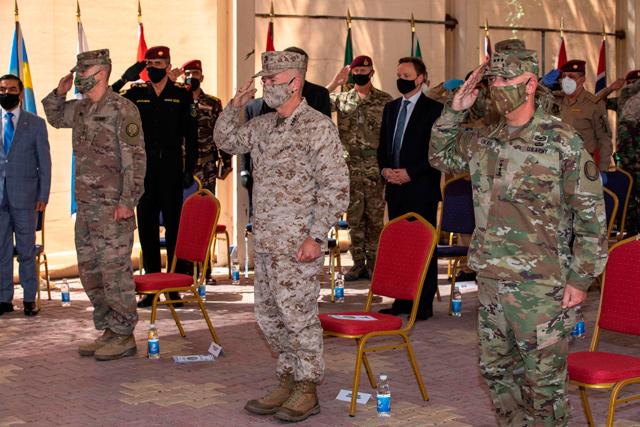- International News
- Thu-2020-09-10 | 04:09 pm

Nayrouz News Agency :
Washington will slash numbers of American troops in Iraq to 3,000 in September, drawing down the bulk of the US-led coalition helping Baghdad root out jihadist sleeper cells.
The announcement follows months of drawdowns by coalition partners, some of them temporary due to fears of Covid-19, and others more permanent as the fight against the Daesh group winds down.
United States
General Kenneth McKenzie, the head of the US military’s Central Command, said in Baghdad on Wednesday that the US will shrink its 5,200-strong force to 3,000 this month.
The US contingent is the largest in the coalition Washington has led in Iraq since 2014 to help fight Daesh.
Over the last six months, the coalition has consolidated its troops from around a dozen bases across the country to three locations: The main command centre in Baghdad, a base in the northern regional capital of Erbil and the sprawling Ain Al Asad Air Base in the west.
Other coalition members see the US presence as providing the necessary security and infrastructure for other foreign troops to deploy.
"If the US were to fully withdraw, we would not have the logistical capability to be here,” a Western diplomatic source told AFP.
The UK
Over 100 UK military personnel remain in Iraq, according to a coalition statement in July, down from 400 last year.
They do not include combat troops, but are instead focused on training and helping Iraqi commanders build strategies to root out extremist remnants.
The British air force still carries out air strikes against those sleeper cells to prevent a resurgence.
France
In late March, coronavirus fears prompted France to withdraw its roughly 200 troops, most of who are tasked with training Iraqi personnel.
But it has continued air raids against Daesh, and French Defence Minister Florence Parly told Iraqi officials in Baghdad in August that she wanted to expand surveillance support to local troops.
French special forces will remain deployed in undisclosed locations in Iraq alongside their UK and US counterparts, diplomatic sources told AFP.
Canada
Earlier this year, Canada announced it would keep fewer than 100 military personnel in Iraq as part of the US-led coalition and NATO’s training mission combined.
Canada had previously deployed around 850 troops — 600 as part of the coalition and 250 in NATO.
They had been helping train Iraqi troops, detonating explosive ordnance, and flying CH-146 Griffon helicopters for reconnaissance and search-and-rescue missions.
Italy, Spain
Italy drastically reduced its estimated 1,000 trainers in Iraq in recent months due to deadly rocket attacks and the spread of the Covid-19 pandemic.
Spain also has around 150 troops in the country, a force which has shrunk due to base closures and coronavirus.
The withdrawals were meant to be temporary but there are no clear timelines for the troops to return.
NATO
NATO, in Baghdad since late 2018, temporarily repositioned some of its personnel outside Iraq due to Covid-19 and increased threats following the US killing of Iranian commander Qassem Soleimani in January.
Top leadership of the US-led coalition was exploring handing over some tasks to NATO in order to alleviate the pressure on Iraq’s government to oust US troops
Turkey
Turkey has had a military presence in Iraq’s autonomous Kurdish region for a quarter of a century, citing the need to protect its borders from Kurdish militants.
In June, Ankara launched a new cross-border ground and air assault into northern Iraq, targeting positions held by the Kurdish Workers’ Party, considered a "terrorist” group by Turkey and the US.
The new operation allowed Turkey to set up additional military posts in the autonomous zone, which has angered Baghdad.













